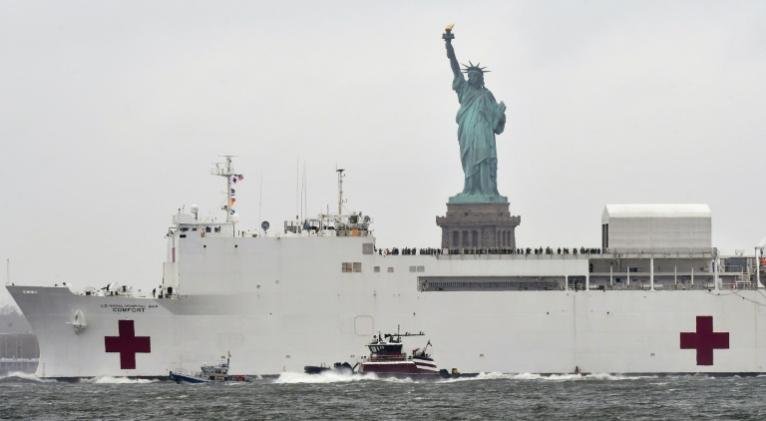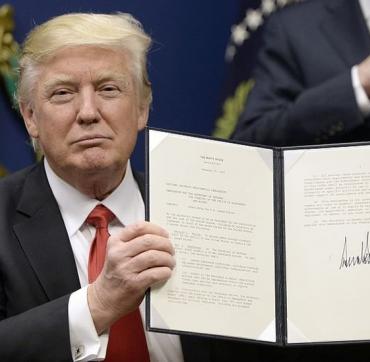US virus toll crosses 100,000 as pandemic rages in Latin America
especiales

The United States has now recorded more than 100,000 coronavirus-related deaths -- a somber milestone and by far the highest total in the world. Photo: Angela Weiss / AFP
The US coronavirus death toll passed 100,000 as the pandemic tightened its grip on South America, which is outpacing Europe and the United States in daily infections.
Global cases have surged to nearly 5.7 million, with more than 354,000 deaths, and in a grim signal to other countries hoping to exit lockdown, South Korea re-imposed social distancing rules after a spike in new cases.
Deaths in Brazil topped 25,000 on Wednesday, and its caseload is second only to the United States, where authorities have moved to ease lockdowns and help the battered economy, despite experts recommending they remain on guard for a resurgence of the disease.
"Don't start leapfrogging over the recommendations of some of the guidelines because that's really tempting fate and asking for trouble," Anthony Fauci, one of the top US health advisers, told CNN.
Nearly 1.7 million Americans are known to have been infected with the disease, according to a Johns Hopkins University tally.
Lockdowns in some form will remain necessary until a vaccine or treatment is available, experts have warned, but many governments are under immense pressure to provide relief as businesses and citizens grow weary and resentful of mass confinement.
Jair Bolsonaro, Brazil's far-right president and a Trump ally, has slammed stay-at-home orders and played down the threat of the virus, saying the economic fallout of lockdowns causes more damage than the disease itself.
But infections in Brazil have surged past 411,000, and similar bad news continues to emerge from other South American countries.
Peru logged a record 6,154 new cases in a 24-hour period, with its virus response coordinator Pilar Mazzetti warning that "difficult days, difficult weeks are coming."
Worried relatives outside the Sabogal Hospital in the capital Lima were unable to enter to see loved ones suffering from COVID-19, with some begging the guards for information.
"I want to talk to a doctor and they don't let me know," said Liset Villanueva, granddaughter of a coronavirus patient.
"They don't say anything, they don't call, they don't explain anything... What is he suffering from?"
The 79 new cases in South Korea come as life appeared to be returning to normal following an extensive "trace, test and treat" program.
Social distancing rules had been relaxed earlier this month, but following the spike -- centred around the densely-populated capital Seoul -- authorities ordered some of them be re-imposed, and for museums, parks and galleries to close again from Friday.
France bans controversial drug
While scientists around the world are racing to develop a vaccine, parallel trials are under way to test treatments for COVID-19 symptoms.
France said Wednesday it was banning the anti-malarial drug hydroxychloroquine as a treatment after the World Health Organization suspended its testing over fears of dangerous side effects.
The drug has proved controversial and divisive, with some leaders and governments still backing it -- including President Trump, who said he had taken a course as a preventative measure because he had "heard a lot of good stories" about it.
Health authorities in Brazil and Senegal, and India's top biomedical research body have said they will continue to use it for COVID-19 patients, but the US Food and Drug Administration has warned of serious side effects and poisoning.
The urgency of the coronavirus crisis has prompted some doctors to prescribe the drug despite a lack of research to demonstrate its effectiveness against the new coronavirus.
Fans at the French Open?
As South America and parts of Africa and Asia scramble to deal with their worsening outbreaks, Europe has taken tentative steps to reopen economies and ease lockdowns as new infections slow.
As the continent -- which has lost more than 175,000 people to COVID-19 -- grappled with the human tragedy and economic destruction, the European Union unveiled a 750-billion-euro ($825 billion) recovery plan to get countries back on their feet.
It follows other emergency measures introduced around the world to rescue economies shattered by the virus, which has also shredded the global sports calendar and brought international travel to a standstill.
Britain's EasyJet became the latest airline to announce huge redundancies Thursday, when it said it will axe almost a third of its 15,000-strong workforce.
While German top-flight football has resumed in empty stadiums, Roland Garros chiefs insisted Wednesday that the French Open will have fans attending even if they still have to abide by social distancing rules when the delayed Grand Slam tournament is held in September.
There was a reminder, however, of the threat still posed by the coronavirus in England, where the globally popular Premier League announced that four more people at its football clubs had tested positive.
'We are starving'
Far from the mega-rich sports leagues of the world, millions are simply trying to survive, having lost their livelihoods during the lockdowns.
In South Africa, millions of refugees and migrants mostly depend on day-to-day informal work, which has catastrophically dried up because of strict confinement measures to contain the lockdown.
Now many are left with few options, as the government called for locals to be favored for jobs as the economy emerges from the crisis.
"As foreign nationals, we are contributing so much to the South African economy, it's totally unfair from the South African government not to help people living on its own soil," said Collin Makumbirofa, a 41-year-old Zimbabwean who has been living in Johannesburg for more than a decade.
"It's very tough, we are starving. Life has become unbearable here."














Add new comment